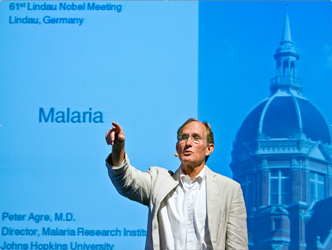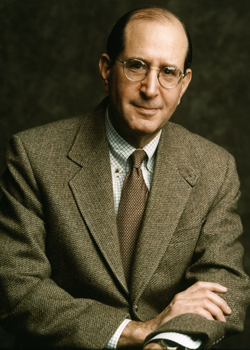University Professorships and University Distinguished Service Professorships are honorary titles awarded by the University, upon the recommendation of the President, to recognize exceptional achievements made by select members of the senior faculty.
University Distinguished Service Professorships
Bloomberg School of Public Health
Held by Peter Agre
 A native of Minnesota, PETER AGRE studied chemistry at Augsburg College (BA 1970) and medicine at Johns Hopkins (MD 1974). He completed his medical residency at Case Western Reserve University Hospital and oncology fellowship at the University of North Carolina at Chapel Hill. Agre joined the Johns Hopkins School of Medicine faculty in 1981 and rose to the rank of Professor of Biological Chemistry and Medicine. Following one term as Vice Chancellor of Science and Technology at Duke University Medical Center, Agre returned to Johns Hopkins in 2008 and serves as Director of the Johns Hopkins Malaria Research Institute at the Bloomberg School of Public Health. He oversees 20 faculty research groups, as well as field activities in Zimbabwe and Zambia.
A native of Minnesota, PETER AGRE studied chemistry at Augsburg College (BA 1970) and medicine at Johns Hopkins (MD 1974). He completed his medical residency at Case Western Reserve University Hospital and oncology fellowship at the University of North Carolina at Chapel Hill. Agre joined the Johns Hopkins School of Medicine faculty in 1981 and rose to the rank of Professor of Biological Chemistry and Medicine. Following one term as Vice Chancellor of Science and Technology at Duke University Medical Center, Agre returned to Johns Hopkins in 2008 and serves as Director of the Johns Hopkins Malaria Research Institute at the Bloomberg School of Public Health. He oversees 20 faculty research groups, as well as field activities in Zimbabwe and Zambia.
Agre is best known for discovery of the aquaporins, a family of water channel proteins found throughout nature. Referred to as “the plumbing system of cells,” aquaporin water channels confer high water permeability to cell membranes. First discovered in human erythrocytes, AQP1 has been characterized biophysically, the atomic structure of AQP1 was solved, and human AQP1-null humans were identified. Twelve homologous proteins exist in humans – transporting water (aquaporins) or transporting water plus glycerol (aquaglyceroporins). These proteins are required for generation of physiological fluids – urine, cerebrospinal fluid, aqueous humor, sweat, saliva, and tears. Involvement of aquaporins in multiple clinical states is becoming recognized – renal concentration, fluid retention, cataract, skin hydration, brain edema, neuromyelitis optica, thermal stress, glucose homeostasis, arsenic poisoning, and even malaria.
In 2003, Agre shared the Nobel Prize in Chemistry with Roderick MacKinnon of Rockefeller University “for discoveries concerning channels in cell membranes.” Agre is also a member of the National Academy of Sciences and the Institute of Medicine for which he chaired the Committee on Human Rights. He holds 18 honorary doctorates from around the world. He has received the Distinguished Eagle Scout Award from the Boy Scouts of America and Commandership in the Royal Norwegian Order of Merit from King Harald V. From 2009-11, Agre served as President and Chair of the Board of Advisors of the American Association for the Advancement of Science. As part of the AAAS Center for Science Diplomacy, Agre led visits of US scientists to North Korea, Myanmar Burma, Iran, and Cuba.
Held by Alfred Sommer
 ALFRED SOMMER, MD, MHS, is a professor of ophthalmology at the Wilmer Eye Institute and Dean Emeritus and professor of epidemiology and international health at the Johns Hopkins Bloomberg School of Public Health. He was the founding Director (1980-1990) of the Dana Center for Preventive Ophthalmology at Johns Hopkins, which focuses on clinical epidemiology and public health aspects of blindness prevention and child survival.
ALFRED SOMMER, MD, MHS, is a professor of ophthalmology at the Wilmer Eye Institute and Dean Emeritus and professor of epidemiology and international health at the Johns Hopkins Bloomberg School of Public Health. He was the founding Director (1980-1990) of the Dana Center for Preventive Ophthalmology at Johns Hopkins, which focuses on clinical epidemiology and public health aspects of blindness prevention and child survival.
Dr. Sommer’s current research interests include outcomes assessment; clinical guidelines; the screening, diagnosis, and management of glaucoma and other blindness prevention strategies; and cost containment. He demonstrated the impact of vitamin A deficiency on childhood blindness and mortality in developing countries. His newest efforts concern the growing interface between medicine and public health. He has published five books and over 300 scientific articles and has received numerous awards. His current research interests include child survival and blindness prevention strategies, micronutrient interventions, and the interface between public health and clinical medicine.
Dr. Sommer received his MD from Harvard Medical School and his MHS in epidemiology from the Johns Hopkins Bloomberg School of Public Health. His many honors include, among others: the Lasker Award for Clinical Medical Research, the How Medal of the American Ophthalmologic Society, the Duke Elder Medal and the Gonin Medal of the International Council of Ophthalmology, the Prince Mahidol Award for Contribution to Medicine and Public Health (from the King of Thailand), and the Helmut Horten, Charles A. Dana, and Pollin Prizes for medical research.
Held by Debra L. Roter
DEBRA L. ROTER, MPH, DrPh, completed her doctorate at Johns Hopkins in 1977 has been a member of the faculty in the School of Public Health since 1980. She serves as Professor in the Department of Health, Behavior and Society and holds appointments as Professor in the Schools of Medicine and Nursing, as well as the Kimmel Cancer Center.
For the past four decades, Dr. Roter’s research has focused on the study of patient-clinician communication and her coding method for analysis of medical dialogue, the Roter Interaction Analysis System (RIAS), has become the international standard by which medical dialogue is assessed. Her coding manual has been translated into 15 languages and there have been hundreds of studies conducted worldwide using her system. Her research addresses the influence of social factors, especially gender and ethnicity, on the dynamics of medical communication and its consequences for health care disparities, quality of care and a variety of patient health outcomes. Her work as an interventionist in activating patients to more fully engage in their care has been widely replicated, as has her approach to teaching communication skills in undergraduate, graduate and postgraduate medical programs.
Dr. Roter has published over 250 research articles and several books in the area of patient-physician communication and is recognized by the Web of Science as among the most highly cited in the social sciences. She has mentored and influenced many of the leaders in the field of health services research, health communication, and medical education.
She has been recognized for outstanding contribution to Health Education Research, from the Society for Public Health Education and by the American Academy on Physician and Patient Award for Outstanding Research Contributing to the Theory, Practice and Teaching of Effective Health Care Communication. She is also the recipient of the Golden Apple Award and the Advising, Mentoring and Teaching Recognition Award for her efforts on behalf of our students.
She was named a University Distinguished Service Professor in the Department of Health, Behavior and Society in 2012.
Held by Diane E. Griffin
 DIANE E. GRIFFIN, MD, PhD, is the former Alfred and Jill Sommer Professor and Chair of Molecular Microbiology and Immunology. Her work on arthropod-borne encephalitis and measles has helped illuminate the basic nature of viral diseases. She and her colleagues have developed a DNA vaccine proven to protect against measles, the first step toward developing a new vaccine that can safely be used to immunize infants in developing countries. Dr. Griffin is former director of the Johns Hopkins Malaria Research Institute, which is mandated to mount a full-scale assault on malaria. In 2004 she was elected to membership in the National Academy of Sciences and named to its Institute of Medicine. A former editor of the Journal of Virology, Dr. Griffin serves on the editorial boards of Virology, Virus Research, and the Journal of NeuroVirology. She has been a faculty member of Johns Hopkins since 1976 and has published more than 200 articles and 100 book chapters. In 2010 Dr. Griffin was named a University Distinguished Service Professor.
DIANE E. GRIFFIN, MD, PhD, is the former Alfred and Jill Sommer Professor and Chair of Molecular Microbiology and Immunology. Her work on arthropod-borne encephalitis and measles has helped illuminate the basic nature of viral diseases. She and her colleagues have developed a DNA vaccine proven to protect against measles, the first step toward developing a new vaccine that can safely be used to immunize infants in developing countries. Dr. Griffin is former director of the Johns Hopkins Malaria Research Institute, which is mandated to mount a full-scale assault on malaria. In 2004 she was elected to membership in the National Academy of Sciences and named to its Institute of Medicine. A former editor of the Journal of Virology, Dr. Griffin serves on the editorial boards of Virology, Virus Research, and the Journal of NeuroVirology. She has been a faculty member of Johns Hopkins since 1976 and has published more than 200 articles and 100 book chapters. In 2010 Dr. Griffin was named a University Distinguished Service Professor.